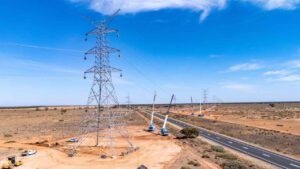It is something of an irony that prime minister Malcolm Turnbull’s attempts to visit the South Australian city of Port Lincoln over the weekend should have been thwarted by strong winds – winds, it should be noted, that provided 100 per cent of the state’s power needs for much of the day.
According to local media reports, Turnbull’s planned visit to Port Lincoln on Sunday was aborted when his plane was unable to land after two attempts due to strong winds.
It is not the first time Turnbull’s attempts to land in Port Lincoln have been thwarted by strong winds – a similar attempt a month ago was also abandoned in the face of bad weather.

The winds in Sunday were strong – not strong enough to stop wind turbines from spinning however, as deputy prime minister Barnaby Joyce and South Australia Senator Nick Xenophon like to believe, but enough to provide more than 100% of South Australia’s underlying electricity demand for more than 10 hours on Sunday.
According to Dylan McConnell from the Melbourne Energy Institute, who provided the graph above, wind provided more than 100 per cent of the state’s needs from 8:10am to 6:40pm.
During that period the price averaged approximately negative $25/MWh. At 2pm on Sunday, wind was (very briefly) was producing 46 per cent more than underlying demand – around 1370 MW of wind and 935MW demand from the grid (which does not include rooftop solar being consumed in homes).
As it happened, it was not just windy that day, but also quite sunny. And according to the APVI solar map, rooftop solar PV was producing about 293MW, which means that variable renewable energy sources (wind and solar) were producing 1,670MW.
Some of that rooftop solar would have been satisfying household demand not seen by the grid (and therefor not included in the 935MW) – but it seems certain that wind and solar were providing one and a half times the state’s electricity needs at the time – and exporting much of it to Victoria.
Turnbull, of course, was a great supporter of the 100 per cent renewable energy concept back in 2010, when he was a mere deposed Opposition leader, but as prime minister with a wafer thin majority over Labor in parliament and an equally small majority over the right wing in his own party, Turnbull’s views have changed.
Following the blackout in late September, Turnbull and his ministers have attacked state-based renewable energy targets in South Australia, Victoria, Queensland, the ACT and the Northern Territory, saying they are all unrealistic and damaging to the economy.
So, it’s a shame Turnbull didn’t get to land in Port Lincoln, which went without power for more than two days after the blackout because its fossil fuel generators didn’t work.
Port Lincoln is a classic example of a town that should be focused on local renewables – wind and solar – battery storage and a local micro grid, rather than centralised generators. The nearest coal generator is more than 1,200kms away in the Latrobe Valley, meaning line losses of more than 10 per cent.
As the owner of one of those Latrobe Valley generators, AGL Energy CEO Andrew Vesey, said recently, the best way to guarantee energy security is to have local micro-grid, and that means more renewables not less.
The case for micro-grids is also being promoted by network owners – because it increases security and saves on grid costs – and the cost of micro-grids is falling quickly as renewable energy and battery storage costs fall.
David Shearman secretary of the Doctors for the Environment Australia, says Port Lincoln clearly has plenty of sun and wind.
“Any rational assessment would find it capable of self-sufficiency and, therefore, during emergency, of being independent of the national grid.
“It is hard to believe that Government policy is to support coal “for many decades to come” and that this support extends to attacking renewable energy because it increasingly threatens coal as the technology becomes cheaper. But rational thought indicates this must be the Government’s irrational policy!”







